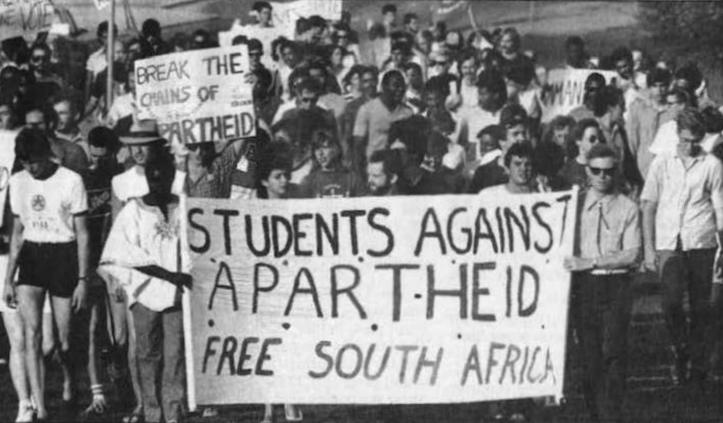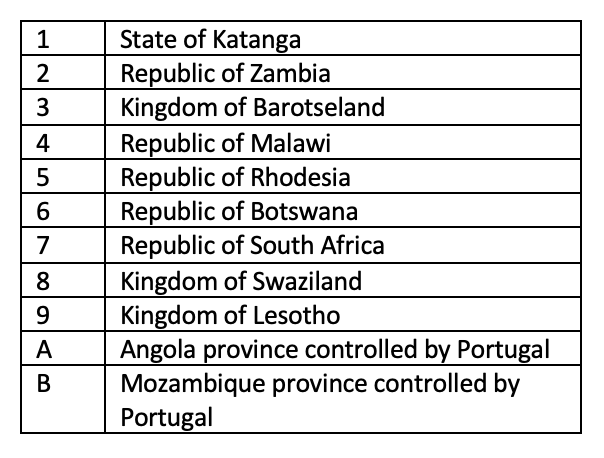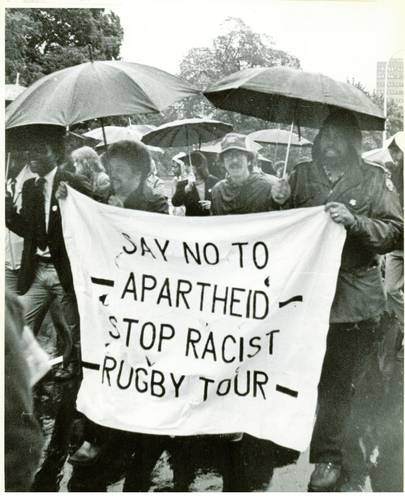8. International opposition to apartheid

There was no single global anti-apartheid movement; rather initiatives were taken in individual countries.
World opinion changed gradually from the 1950s from a time when the British and French Empires were still largely intact, to the 1960s onwards as countries throughout Africa gained independence. This was a change also acknowledged by the colonising powers, with the British Prime Minister, MacMillan, and his famous ‘wind of change’ speech to the South African Parliament in Cape Town in February 1960.
The South African government did not respond to this speech in the way that Macmillan hoped. Verwoerd decided that he no longer wanted the British monarch to be head of state and held a referendum among white South African to try to bring this about. He succeeded, though only by a small majority, and in 1961 South Africa became an independent republic. After facing criticism at the Commonwealth Conference in London, South Africa also left the Commonwealth.
- According to Macmillan, what changes have come about in recent years?
- What does he suggest should be the basis of a person’s achievements in life?
- In what ways does he suggest that South African policies need to change?
‘We have seen the awakening of national consciousness in peoples who have for centuries lived in dependence upon some other power. Fifteen years ago, this movement spread through Asia. Many countries there of different races and civilisations pressed their claim to an independent national life. Today the same thing is happening in Africa…The wind of change is blowing through this continent, and, whether we like it or not, this growth of national consciousness is a political fact.
Our justice is rooted in the same soil as yours - in Christianity and in the rule of law as the basis of a free society. This experience of our own explains why it has been our aim in the countries for which we have borne responsibility, not only to raise the material standards of living, but also to create a society which respects the rights of individuals, a society in which men are given the opportunity to grow to their full stature - and that must in our view include the opportunity to have an increasing share in political power and responsibility, a society in which individual merit and individual merit alone is the criterion for a man's advancement, whether political or economic.
As a fellow member of the Commonwealth, it is our earnest desire to give South Africa our support and encouragement, but I hope you won't mind my saying frankly that there are some aspects of your policies which make it impossible for us to do this without being false to our own deep convictions about the political destinies of free men to which in our own territories we are trying to give effect. I think we ought, as friends, to face together, without seeking to apportion credit or blame, the fact that in the world of today this difference of outlook lies between us…’
Pressure on South Africa also built during the 1960s as a result of African countries gaining independence. They joined the UN where they added to the critical mass against the policy of apartheid, and in 1963 they formed the Organisation of African Unity (OAU) which had the end of apartheid as one of its main aims.
In 1969 the OAU published the Lusaka Manifesto. It clearly stated its opposition to apartheid, ‘In…South Africa, there is an open and continued denial of the principles of human equality…The societies of these territories are being deliberately organised so as to try and destroy these principles…. We believe that all the peoples who have made their homes in the countries of southern Africa are Africans, regardless of the colour of their skins.’
The Manifesto also promised help to black South Africans fighting against apartheid: ‘We have always preferred, and still prefer to achieve (liberation) without physical violence…. But while peaceful progress is blocked by the actions of those at present in power in the states of southern Africa, we have no choice but to give to the peoples of those territories all the support of which we are capable in their struggle against their oppressors.’



Study the maps and discuss in pairs the following questions:
1. Which country was entirely surrounded by South Africa?
2. Which countries shared most of their border with South Africa?
3. Looking at these maps, and taking account of what you already know about South Africa, why do you think South Africa was able to ignore hostile attitudes towards apartheid from other African countries?
Clearly, there were limits to what could be achieved in the short term. Whilst South Africa’s black neighbours wanted apartheid to end, they were not strong enough to apply pressure. South Africa was the dominant power in the region both economically and militarily, and surrounding countries needed to maintain good relations with them, for their own economic survival. This was especially so for countries like Lesotho whose inhabitants earned their wages from South African mines and factories. However even countries like Zambia, were dependent on South Africa for essentials such as food, and to import and export overseas via South African transport links. Militarily, South Africa was in a strong position and neighbouring countries could not risk a conflict which they could not win.
The new African nations were, however, able to voice their feelings about South Africa at the United Nations which had already been critical of apartheid, passing annual resolutions condemning South African racial policy since 1952. Given, their lack of success, the UN General Assembly decided to take further action and in 1962 requested governments to apply sanctions, whether economic or some other type.
Sanctions could be placed on particular goods for example, so that South Africa would be unable to purchase them, or sports teams might refuse to take part in (or boycott) international fixtures taking place in South Africa. Sanctions might also be applied more widely so that no trade could take place with a country which was under the penalty of sanctions. The aim was to make life so difficult for that country, that it would change its policies. Although South Africa was a wealthy country, with many natural resources, the one thing it did lack was its own oil. Therefore, it could have been very vulnerable to economic sanctions if it was unable to import oil.
However, there were reasons why countries were reluctant to impose economic sanctions on South Africa. There was a cost to sanctions, especially as South Africa had mineral reserves which the rest of the world needed for steel and oil production and the manufacture of cars. There were also profits to be made by investors in South Africa and by 1978, $26.3 billion had been invested in the South African economy principally by businesses and individuals in the US, Europe and Japan. Clearly, they would be opposed to any sanctions. So, the difficulty was that imposing economic sanctions on South Africa would damage the economies of those countries which implemented them and might cause their governments to lose power in elections.
 The most effective sanctions up to 1980 were sports related, rather than economic. As South Africa were enthusiastic participants in international sport, particularly cricket and rugby, this hit them hard. In 1964 they were suspended from the Olympic Games and then excluded formally from 1970. International cricket tours also faced protests and in 1970 the South African Cricket tour to England was cancelled by the MCC (Marylebone Cricket Club). In 1977 the Commonwealth passed the Gleneagles Agreement which prohibited any member from participating in any sporting activity with South Africa.
The most effective sanctions up to 1980 were sports related, rather than economic. As South Africa were enthusiastic participants in international sport, particularly cricket and rugby, this hit them hard. In 1964 they were suspended from the Olympic Games and then excluded formally from 1970. International cricket tours also faced protests and in 1970 the South African Cricket tour to England was cancelled by the MCC (Marylebone Cricket Club). In 1977 the Commonwealth passed the Gleneagles Agreement which prohibited any member from participating in any sporting activity with South Africa.
In 1980 the UN passed a resolution for a comprehensive cultural and academic boycott of South Africa.
Actions by ordinary people were key in putting pressure on governments to take action. During the 1960s the British Anti Apartheid Movement (AAM) launched a wide range of boycotts by unions and guilds related to the arts to work alongside sporting and economic sanctions. In the 1980s the 'Free Nelson Mandela' campaign culminated in a Free Nelson Mandela concert in Hyde Park in 1988.
The AAM also put pressure on the US government in the 1980s as the video below shows.
What examples of protest in the US against apartheid are given in this video?
What reasons are given as to the effectiveness of this protest?
Research further international campaigns against South Africa.
You could divide the class into groups for this activity, each focusing on a different campaign (which can be in any country). Each group should then prepare a presentation to the rest of the class on the actions taken by campaigners, the response by the governments in which the campaigns took place (did they lead the campaign or oppose it?), and the impact on South Africa.
Use this page from Forward to Freedom as a starting point to identify the different international campaigns.
Videos from campaigners in the UK can be found here
The South African history site also has a comprehensive overview of different campaigns
Many world leaders, including the Conservative Party in Britain opposed boycotts and sanctions. The Conservative Party developed instead strategies that came to be known as 'constructive engagement'. This was also taken up by Reagan in the US. They argued that investors in South Africa should use their influence to improve wages and conditions for black workers in South Africa as whole. They also argued that economic growth in South Africa would reveal the weaknesses of apartheid; for example, as the demand for workers in the south African cities expanded, so it would be increasingly difficult to control urbanisation and companies needing more black workers would have to pressurise the the government to relax its rules on jobs and skills.
Discuss in pairs the reasons why many governments would have opposed the actions of the AAM. (Also see below for the section on the Cold War).
How would an AAM activist argue against the strategies of 'constructive engagement'.
As an alternative to the above task, students could each take on a different role; one as a member of the British Conservative Party in the 1970s or Reagan's administration in early 1980s, and the other an AAM activist. They should then present to each other their ideas and debate why their approach would be more effective in ending apartheid.
The Cold War had a positive impact on South Africa in the sense that it was able to present itself as a bulwark against communism. Recognising that the international community would be reluctant to do anything which might put South Africa with its valuable resources into the hands of the Soviet Union, the government blamed communism for uprisings in South Africa in order to portray itself as standing for the values of the capitalist nations in their fight against communism.
Although the ANC did have links with communists and benefitted from help from the Soviet Union such as training South African refugees and supplying weapons, they did so primarily because they needed help to defeat a powerful regime. However, the South African government was able to exploit these links to avoid economic sanctions. The risk, as far as the West was concerned, was that a change in regime in South Africa could lead to communists taking over. During the Cold War this seemed to be the main threat, and therefore there was a lack of real enthusiasm for sanctions in the world community.
Until the mid 1980s, economic sanctions against South Africa had a limited impact. As you have seen above, there were several reasons why governments refused to take direct action against South Africa - mainly linked to their need to continue trading and also the Cold War context.
However, during the 1980s, opposition towards apartheid grew in the USA; this was linked also to the diminishing fear of communism and the USSR from the late 1980s. As you saw in the video above, Congress overrode the president's veto over sanctions and as a result, more companies withdrew investment - 50 in 1986 and 40 in 1987. US banks also refused to rew loans.
One report in 1989 estimated that economic sanctions had reduced the potential growth rate in South Africa by ten per cent and cost 5 million potential jobs.
The South African government was determined to fight international criticism, believing that it was not the business of the world to interfere with South Africa’s internal politics, and that a negative press both from the English-speaking community within South Africa, and internationally, was to blame.
Dr Mulder, the Minister of Information in Vorster’s government, persuaded him to invest in a massive campaign of propaganda which involved taking £40 million from the defence budget and spending it on bribing international news agencies to paint a more positive picture of apartheid South Africa. The defence budget was used as it was protected from public scrutiny, even though the Minister of Defence, P.W. Botha was opposed to the plan. Money was used to buy luxury flats to win over foreign journalists and news agencies. In South Africa itself the government covertly set up The Citizen newspaper, hiding the fact that it was funded from government money in order to try to ‘balance’ the negativity of the English-speaking newspapers.
In 1977, this was uncovered by two journalists, forcing Vorster to resign. Dr Mulder had been his intended successor as Prime Minister, but as a result of the scandal he was unable to stand, much to the disappointment of many in the National Party. As a result, P.W. Botha was elected, but he won narrowly, indicating that he did not have very much support in the Party.

 IB Docs (2) Team
IB Docs (2) Team
